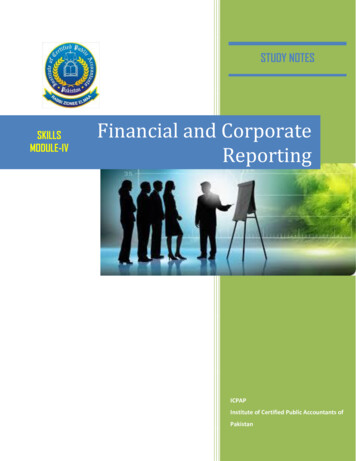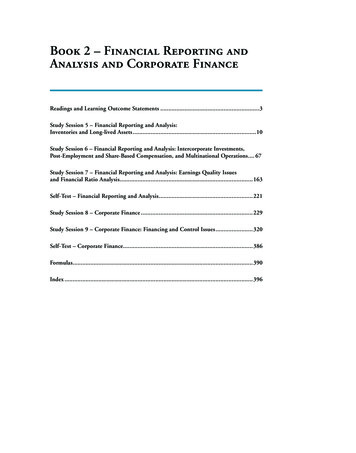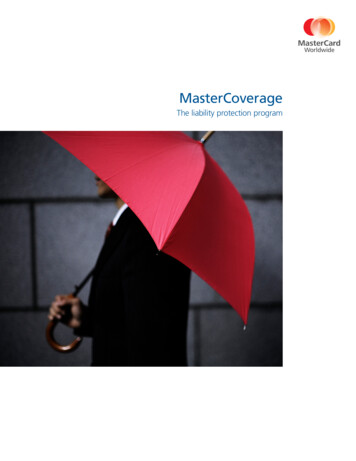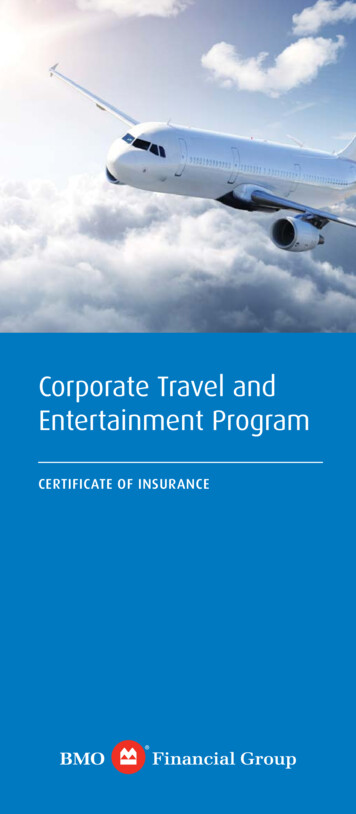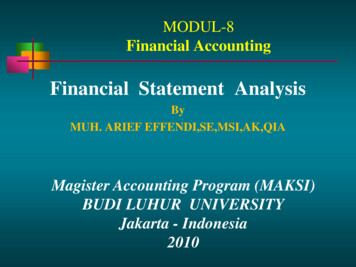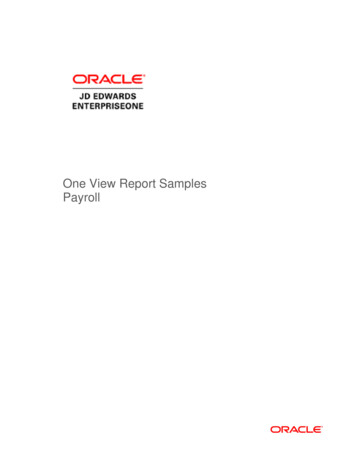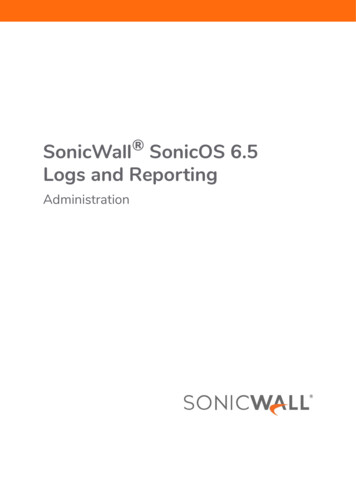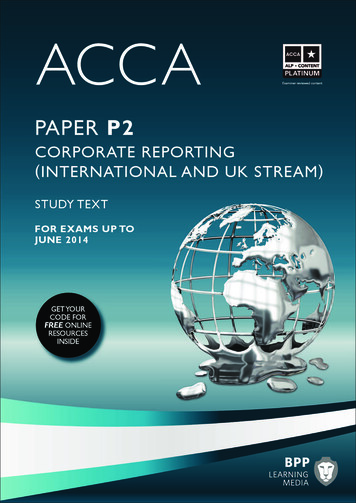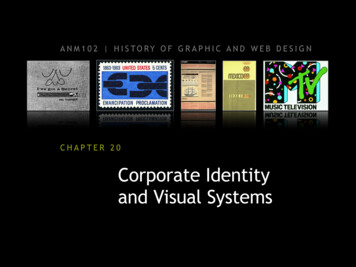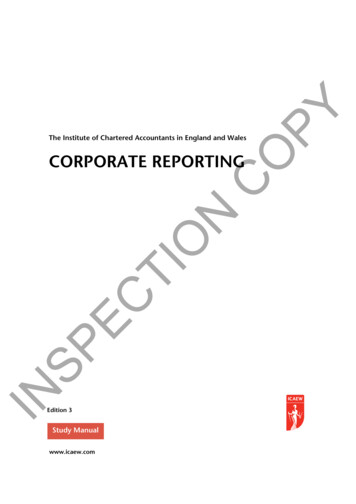
Transcription
OPYThe Institute of Chartered Accountants in England and WalesINSPECTIONCCORPORATE REPORTINGEdition 3Study Manualwww.icaew.com
Corporate ReportingThe Institute of Chartered Accountants in England and WalesFirst edition 2013Third edition 2015All rights reserved. No part of this publication may be reproduced, stored in aretrieval system or transmitted in any form or by any means, graphic, electronic ormechanical including photocopying, recording, scanning or otherwise, withoutthe prior written permission of the publisher.The content of this publication is intended to prepare students for the ICAEWexaminations, and should not be used as professional advice.British Library Cataloguing-in-Publication DataA catalogue record for this book is available from the British LibraryCOriginally printed in the United Kingdom by Polestar Wheatons on paper obtainedfrom traceable, sustainable sources.OPYISBN: 978-1-78363-230-5Previous ISBN: 978-1-78363-010-3INSPECTIONPolestar WheatonsHennock RoadMarsh BartonExeterEX2 8RP The Institute of Chartered Accountants in England and Wales
The International Accounting Standards Board (IASB)30 Cannon Street, London, EC4M 6XH, United Kingdom.Email: info@ifrs.org Web: www.ifrs.orgDisclaimer: The IASB, the International Financial Reporting Standards (IFRS)Foundation, the authors and the publishers do not accept responsibility for anyloss caused by acting or refraining from acting in reliance on the material in thispublication, whether such loss is caused by negligence or otherwise to themaximum extent permitted by law.Copyright IFRS FoundationCAll rights reserved. Reproduction and use rights are strictly limited. No part of thispublication may be translated, reprinted or reproduced or utilised in any formeither in whole or in part or by any electronic, mechanical or other means, nowknown or hereafter invented, including photocopying and recording, or in anyinformation storage and retrieval system, without prior permission in writing fromthe IFRS Foundation. Contact the IFRS Foundation for further details.OPYThe publishers are grateful to the IASB for permission to reproduce extracts fromthe International Financial Reporting Standards including all InternationalAccounting Standards, SIC and IFRIC Interpretations (the Standards). TheStandards together with their accompanying documents are issued by:NThe IFRS Foundation logo, the IASB logo, the IFRS for SMEs logo, the “HexagonDevice”, “IFRS Foundation”, “eIFRS”, “IAS”, “IASB”, “IFRS for SMEs”, “IASs”,“IFRS”, “IFRSs”, “International Accounting Standards” and “International FinancialReporting Standards”, “IFRIC” “SIC” and “IFRS Taxonomy” are Trade Marks ofthe IFRS Foundation.INSPECTIOFurther details of the Trade Marks including details of countries where the TradeMarks are registered or applied for are available from the Licensor on request.iii
Welcome to ICAEWI am delighted that you have chosen ICAEW to progress your journey towards joining the charteredaccountancy profession. It is one of the best decisions I also made.The role of the accountancy profession in the world's economies has never been more important. Peoplemaking financial decisions need knowledge and guidance based on the highest technical and ethicalstandards. ICAEW Chartered Accountants provide this better than anyone. They challenge people andorganisations to think and act differently, to provide clarity and rigour, and so help create and sustainprosperity all over the world.OPYAs a world leader of the accountancy and finance profession, we are proud to promote, develop andsupport over 144,000 chartered accountants worldwide. Our members have the knowledge, skills andcommitment to maintain the highest professional standards and integrity. They are part of somethingspecial, and now, so are you. It's with our support and dedication that our members, and hopefullyyourself, will realise career ambitions, maintain a professional edge and contribute to the profession.You are now on your journey towards joining the accountancy profession, and a highly rewarding careerwith endless opportunities. By choosing to study for our world-leading chartered accountancyqualification, the ACA, you too have made the first of many great decisions in your career.CYou are in good company, with a network of over 26,000 students around the world made up of likeminded people; you are all supported by ICAEW. We are here to support you as you progress throughyour studies and career; we will be with you every step of the way, visit page x to review the keyresources available as you study.INSPECTIOMichael IzzaChief ExecutiveICAEWNI wish you the best of luck with your studies and look forward to welcoming you to the profession in thefuture.ivCorporate Reporting
ContentsIntroductionvii Corporate Reportingviii Permitted Textsix Key ResourcesxPrinciples and Regulations in Corporate Reporting and Auditing1.Introduction2.Principles of corporate reporting143Ethics and GovernanceEthics4.Corporate governance91139The Modern Audit ProcessC3.OPY The statutory audit: planning and risk assessment6.The statutory audit: audit evidence7.The statutory audit: evaluating and testing internal controls3238.The statutory audit: finalisation, review and reporting351N5.OReporting Performance187243Reporting financial performance40710.Reporting revenue46511.Earnings per shareSPECTI9.507Assets and Liabilities12.Reporting of assets54513.Reporting of non-financial liabilities603Financing14.Leases, government grants and borrowing costs63315.Financial instruments: presentation and disclosure67716.Financial instruments: recognition and measurement69917.Financial instruments: hedge accounting775RemunerationEmployee benefits85119.Share-based payment899IN18.Business Combinations20.Groups: types of investment and business combination957Reporting Foreign Activities21.Foreign currency translation and hyperinflation1069Taxation22.Income taxes1127v
Financial Statement AnalysisFinancial statement analysis 1118324.Financial statement analysis 2124525.Assurance and related services131926.Environmental and social considerations136927.Internal auditing1407 Index1437OPY23.INSPECTIONCQuestions within the study manual should be treated as preparation questions, providing you with afirm foundation before you attempt the exam-standard questions. The exam-standard questions arefound in the question bank.viCorporate Reporting
1 IntroductionACA qualificationThe ICAEW chartered accountancy qualification, the ACA, is a world-leading professional qualification inaccountancy, finance and business.The ACA has integrated components that give you an in-depth understanding across accountancy,finance and business. Combined, they help build the technical knowledge, professional skills andpractical experience needed to become an ICAEW Chartered Accountant.OPYEach component is designed to complement each other, which means that you can put theory intopractice and you can understand and apply what you learn to your day-to-day work. Progressionthrough all the elements of the ACA simultaneously will enable you to be more successful in theworkplace and exams.The components are: Professional developmentEthics and professional scepticism3-5 years practical work experience15 accountancy, finance and business modulesINSPECTIONCTo find out more on the components of the ACA and what is involved in training, visit your dashboardat icaew.com/dashboard.Introductionvii
2 Corporate ReportingThe full syllabus and technical knowledge grids can be found within the module study guide. Visiticaew.com/dashboard for this and more resources.2.1Module aimOPYTo enable candidates to apply technical knowledge, analytical techniques and professional skills toresolve compliance and business issues that arise in the context of the preparation and evaluation ofcorporate reports and from providing audit services.Candidates will be required to use technical knowledge and professional judgement to identify, explainand evaluate alternatives and to determine the appropriate solutions to compliance issues, giving dueconsideration to the needs of clients and other stakeholders. The commercial context and impact ofrecommendations and ethical issues will also need to be considered in making such judgements.On completion of this module, candidates will be able to:Formulate, implement and evaluate corporate reporting policies for single entities and groups ofvarying sizes and in a variety of industries. They will be able to discern and formulate theappropriate financial reporting treatment for complex transactions and complex scenarios.Candidates will be able to evaluate and apply technical knowledge from individual accountingstandards and apply professional skills to integrate knowledge where several accounting standardsare simultaneously applicable and interact. Analyse, interpret, evaluate and compare financial statements of entities both over time and acrossa range of industries. Explain the processes involved in planning an audit, evaluating internal controls, appraising risk,gathering evidence and drawing conclusions in accordance with the terms of the engagement. Inaddition, they will be able to perform a range of assurance engagements and related tasks. Evaluate corporate reporting policies, estimates and disclosures in a scenario in order to be able toassess whether they are in compliance with accounting standards and are appropriate in thecontext of audit objectives. Identify and explain ethical issues. Where ethical dilemmas arise, candidates will be able torecommend, justify and determine appropriate actions and ethical safeguards to mitigate threats.SPECTIONC 2.2Method of assessmentThe Corporate Reporting module will be examined using a paper-based assessment of 3.5 hours. Eachexam will contain questions requiring integration of knowledge and skills, including ethics. Candidateswill be allowed to take any written or printed materials into the exam hall subject to practical spacerestrictions.The exam will consist of three questions. Ethical issues and problems could appear in any of the threequestions.2.3Specification gridINThis grid shows the relative weightings of subjects within this module and should guide the relativestudy time spent on each. Over time the marks available in the assessment will be within the ranges ofweightings below, but slight variations may occur in individual papers to enable suitably rigorousquestions to be set.Syllabus areaCorporate Reporting – ComplianceCorporate Reporting – Financial statement analysisAudit and ur exam will consist of three questions. Ethical issues and problems could appear in any of the threequestions.viiiCorporate Reporting
3 Permitted textsAt the Professional and Advanced Levels there are specific texts that you are permitted to take into yourexams with you. All information for these texts, the editions that are recommended for yourexaminations and where to order them from, is available on www.icaew.com/permittedtexts.Professional Level ExaminationsPermitted Text Financial Accounting and Reporting OPYAudit and Assurance Tax Compliance Business Strategy Financial ManagementBusiness Planning: Banking/Insurance/TaxationAdvanced Level ExaminationsNo restrictionsCCorporate ReportingNo restrictionsStrategic Business ManagementNo restrictionsNo restrictionsNCase StudyOBusiness Planning: Banking/Insurance/Taxation and the Advanced Level exams have no restrictions soyou may take any hard copy materials in to these exams that you wish, subject to practical spacerestrictions.SPECTIAlthough the examiners use the specific editions listed to set the assessment, you may use a differentedition of the text at your own risk. If you use a different edition within your exams, you should notethis inside your answer booklet, at the beginning of the question.INThis information, as well as what to expect and what is and is not permitted in your exams is available inthe Instructions to Candidates. You will be sent this with your exam admission details and it is alsoavailable on our website; www.icaew.com/exams.Introductionix
4 Key resourcesStudent support teamOur student support team is here to help you as much as possible, providing full support throughoutyour studies.T 44 (0)1908 248 250F 44 (0)1908 248 069E studentsupport@icaew.comOPYStudent websiteThe student area of our website provides the latest information, guidance and exclusive resources tohelp you progress through the ACA. Find everything you need (from sample papers to errata sheets) aticaew.com/dashboard.Online student communityCThe online student community provides support and practical advice – wherever you are, whenever youneed it. With regular blogs covering a range of work, life and study topics as well as a forum where youcan post your questions and share your own tips. Join the conversation aticaew.com/studentcommunity.TuitionOFaculties and special interest groupsNThe ICAEW Partner in Learning scheme recognises tuition providers who comply with our core principlesof quality course delivery. If you are receiving structured tuition with an ICAEW Partner in Learning,make sure you know how and when you can contact your tutors for extra help. If you are not receivingstructured tuition and are interested in classroom, online or residential learning, take a look at ourrecognised Partner in Learning tuition providers in your area, on our website icaew.com/dashboard.Faculties and special interest groups support and develop members and students in areas of work andindustry sectors that are of particular interest.SPECTIOur seven faculties provide knowledge, events and essential technical resources. Register to receive acomplimentary e-magazine from one faculty of your choice each year throughout your studies.Our 12 special interest groups provide practical support, information and representation within a rangeof industry sectors. Register to receive free provisional membership of one group each year throughoutyour studies.Find out more about faculties and special interest groups at icaew.com/facultiesandsigs.Library & Information ServiceThe Library & Information Service is ICAEW’s world-leading accountancy and business library.INThe library provides access to thousands of resources online and a document delivery service, you’ll besure to find a useful eBook, relevant article or industry guide to help you. Find out more aticaew.com/library.xCorporate Reporting
INOPYSPECTIONIntroductionCCHAPTER 1IntroductionTopic List1 Using this Study Manual2 The importance of corporate reporting3 The role and context of modern auditing4 Legal responsibilities of directors and auditors5 International standards on auditing6 Audit quality controlSummary and Self-testTechnical referenceAnswers to Self-testAnswers to Interactive questions1
IntroductionLearning objectivesTick offAppraise and explain the role and context of auditing Explain the nature and purpose of quality assurance (at the level of both the firm and theindividual audit) and assess how it can contribute to risk management Comment on and critically appraise the nature and validity of items included in publishedfinancial statementsINSPECTIONCSpecific syllabus references for this chapter are: 2(a), 10(a), 10(b).OPY 2Corporate Reporting
1 Using this Study ManualCHAPTERSection overview This section gives a brief outline of how this Study Manual is structured and why. The key point is that the Corporate Reporting paper is integrated, so financial reporting andauditing must be studied together.1The importance of integrationOPY1.1The aim of the Corporate Reporting module is as follows:'To enable candidates to apply technical knowledge, analytical techniques and professional skills toresolve compliance and business issues that arise in the context of the preparation and evaluationof corporate reports and from providing audit services.CCandidates will be required to use technical knowledge and professional judgement to identify,explain and evaluate alternatives and to determine the appropriate solutions to compliance issues,giving due consideration to the needs of clients and other stakeholders. The commercial contextand impact of recommendations and ethical issues will also need to be considered in making suchjudgements.'It is clear from this that the application of technical knowledge (financial reporting, audit, assuranceand ethics) is integrated, so it is appropriate that these areas are studied together where possible.1.2.1How this Study Manual is structuredO1.2NAt earlier levels you will have tended to study subjects in isolation, but this is no longer appropriate atAdvanced Level, and indeed in the real world.Principles and regulations in financial reporting and auditingSPECTIThis chapter and Chapter 2 cover the role and context of auditing and general principles of corporatereporting. This will largely be revision, but some of the regulations and standards will have changedsince your earlier studies. The aim is to set the more specialised topics, and the integrated areas, incontext.1.2.2Ethics and governanceChapters 3 and 4 look at ethics and corporate governance. These topics underpin corporate reportingand auditing, and ethical matters come up in all kinds of contexts, both in the exam and in yourworking life as a professional. It is necessary to cover all relevant audit principles first because, in thelater chapters on reporting performance and position, the principles are applied in audit focus sections.1.2.3The modern audit processIn Chapters 5 to 8 we revise and build on the auditing material covered at the Professional Level. Thiswill put you in the position where you can consider the audit and assurance issues in relation to specificfinancial reporting topics, the aim being to study financial reporting and auditing together.Financial reporting chaptersIN1.2.4Chapters 9 to 22 deal with the financial reporting and auditing of specific areas: Reporting performanceAssets and liabilitiesFinancingRemunerationBusiness combinationsReporting foreign activitiesTaxationIntroduction3
The financial reporting aspects are covered first, followed by an 'audit focus' section for each topic,looking at the specific audit issues arising from the financial reporting of that area, generally withexamples and/or questions. For example, the chapter on share-based payment has at the end a sectionon auditing share-based payment.OPYAudit focus sections may in turn be split into general and specific sections. For example, Chapter 9Reporting Financial Performance covers general issues, including creative accounting, for which auditorsneed to be alert. However, a more specific section will refer back to standards and the auditing of, forexample, related party disclosures, which has its own designated ISA (UK and Ireland) and particularrisks. These sections allow scope for integrated examples or questions covering both corporate reportingand auditing elements.Finally the self-test questions at the end of chapters will contain integrated questions where relevant.1.2.5Financial analysis chaptersOnce you have a thorough understanding of the financial reporting and related auditing issues,including analytical procedures, you will be in a position to analyse and interpret the financialstatements. You will not have studied financial analysis before, so Chapter 23 provides an introduction,and Chapter 24 deals with more advanced topics.Assurance and other related servicesC1.2.6The Study Manual concludes with coverage of assurance and related services, which can more easily beunderstood in the context of the knowledge you have gained in the earlier chapters.N2 The importance of corporate reportingOSection overviewCorporate reporting embraces financial reporting, and both are different from managementaccounting. Financial statements are used to make economic decisions by a wide range of users. All users require information regarding:SPECTI –––2.12.1.1Financial positionFinancial performanceChanges in financial positionWhat is corporate reporting?Financial reportingFinancial reporting is the process of identifying, measuring and communicating economic informationto others so that they may make decisions on the basis of that information and assess the stewardship ofthe entity's management.Financial reporting involves:IN Recording transactions undertaken by a business entityGrouping similar transactions together which are appropriate to the businessPresenting periodic resultsFinancial reporting focuses on the preparation of published financial information. Typically, thisinformation is made available annually or half-yearly (sometimes quarterly) and is presented in formatslaid down or approved by governments in each national jurisdiction.4Corporate Reporting
2.1.2Corporate reportingCHAPTERCorporate reporting is a broader term than financial reporting, although the two are often usedinterchangeably. As will be evident from this Study Manual and the exam it prepares you for, corporatereporting covers reports other than financial statements, in particular audit reports, but alsoassurance, internal audit and environmental reports.PricewaterhouseCoopers states on its website:'The exact definition of corporate reporting differs depending on who you speak to. However,throughout this web site we use the term "corporate reporting" to refer to the presentation anddisclosure aspects – as distinct from accounting/measurement – of the following areas of reporting:OPY 1Integrated reportingFinancial reportingCorporate governanceExecutive remunerationCorporate responsibilityNarrative reporting'CIn the context of professional accountancy examinations, a Corporate Reporting paper is generallyhigher level than a Financial Reporting paper. In the context of your examination, Corporate Reportingis a more appropriate title because the paper is not just on financial reporting.2.1.3NGeneral principles relating to corporate reporting are set out in the IASB Conceptual Framework forFinancial Reporting (Conceptual Framework), which is covered in Chapter 2, together with regulatorymatters and selected International Financial Reporting Standards (IFRS) that set out principles andframeworks.Management accountingOBy contrast, management accounting or reporting is internal reporting for the use of themanagement of a business itself. Internal management information can be tailored to management'sown needs and provided in whatever detail and at whatever frequency (eg continuous real-timeinformation) management decides is best suited to the needs of their business.SPECTIThe distinction is not so clear-cut, in that management decisions may be affected by external reportingissues, for example, if a director's bonus depends on profit. These matters are covered in Chapter 24 onthe more advanced aspects of financial analysis.Interactive question 1: Management decisionsCan you think of another example of a way in which management decisions may be influenced byexternal reporting requirements?See Answer at the end of this chapter.2.2EntityINMost accounting requirements are written with a view to use by any type of accounting entity,including companies and other forms of organisation, such as a partnership. In this Study Manual, theterm 'company' is often used, because the main focus of the syllabus is on the accounts of companiesand groups of companies, but International Financial Reporting Standards generally refer to entities.2.3Financial statementsThe principal means of providing financial information to external users is the annual financialstatements. Financial statements provide a summary of the performance of an entity over a particularperiod and of its position at the end of that period.Introduction5
A complete set of financial statements prepared under IFRS comprises:(a)The statement of financial position(b) The statement of profit or loss and other comprehensive income or two separate statements beingthe statement of profit or loss and the statement of other comprehensive income (statements offinancial performance)(c)The statement of changes in equity (another statement of financial performance)(d) The statement of cash flowsNotes to the financial statementsOPY(e)The notes to the financial statements include:(a)Accounting policies, ie the specific principles, conventions, rules and practices applied in order toreflect the effects of transactions and other events in the financial statements(b) Detailed financial and narrative information supporting the information in the primary financialstatementsOther information not reflected in the financial statements, but which is important to users inmaking their assessments (an example of this would be the disclosures relating to contingent assetsor liabilities)C(c)The individual elements that are included in the financial statements are covered in detail later in thischapter.Requirement to produce financial statementsN2.4OLimited liability companies are required by law to prepare and publish financial statements annually.The form and content may be regulated primarily by national legislation, and in most cases must alsocomply with Financial Reporting Standards.In the UK, all companies must comply with the provisions of the Companies Act 2006 (CA 2006). Thekey impact of this is as follows:Every UK registered company is required to prepare financial statements for each financial yearwhich give a true and fair view.SPECTI(a)(b) The individual (and some group) financial statements may be prepared:2.5(i)In accordance with the CA 2006 (as regards format and additional information provided byway of notes); or(ii)In accordance with international accounting standards.Financial reporting standardsCompany financial statements must also comply with relevant reporting standards. In the UK these areas follows.IN(a)Accounting StandardsThese include Financial Reporting Standards (FRSs) which are issued by the UK AccountingStandards Board (ASB) and Statements of Standard Accounting Practice (SSAPs) which havebeen adopted by the ASB. (SSAPs were originally issued by the Accounting Standards Committee(ASC), which was replaced by the ASB in 1990.) FRSs and SSAPs will apply to the majority ofindividual company financial statements in the UK, as most companies will choose to prepare theirindividual financial statements in accordance with the CA 2006 (see section 2.4 above).(b) Financial Reporting Standard for Smaller Entities (FRSSE)6This brings together all the accounting guidance which UK small companies are required tofollow in drawing up their financial statements.Corporate Reporting
International Financial Reporting Standards (IFRS)CHAPTERThese are issued by the International Accounting Standards Board (IASB). UK companies whosesecurities are traded in a regulated public market, eg the London Stock Exchange, must preparegroup accounts in accordance with IFRS.These learning materials assume the preparation of financial statements in accordance with IFRS.Unincorporated entities are exempt from the above requirements but may need to follow otherregulation, eg charities must comply with the Charities Act. Incorporated charities must prepare theirfinancial statements in accordance with the CA 2006 (ie the IFRS option is not open to them).1OPYPoint to note:The term UK Generally Accepted Accounting Practice (GAAP) refers to all the rules, from whateversource, which govern UK accounting. In the UK this is seen primarily as a combination of: Company law (mainly CA 2006)Accounting StandardsStock Exchange requirements2.6CIn the UK, GAAP has no statutory or regulatory authority or definition (unlike some other countriessuch as the United States) although the use of the term is increasingly common in practice.Fair presentationIAS 1 Presentation of Financial Statements requires financial statements to 'present fairly' the financialposition and performance of an entity.N'Present fairly' is explained as representing faithfully the effects of transactions. In general terms this willbe the case if IFRS are adhered to. IAS 1 states that departures from international standards are onlyallowed:In extremely rare cases; Where compliance with IFRS would be so misleading as to conflict with the objectives of financialstatements as set out in the Conceptual Framework, that is to provide information about financialposition, performance and changes in financial position that is useful to a wide range of users.SPECTIO 2.7Judgements and financial statementsAlthough IFRS narrow down the range of acceptable alternative accounting treatments, there are stillmany areas which are left to the discretion of the directors of the company. On the whole, the conceptof faithful representation should result in transactions being 'presented fairly'. However, commercial andfinancial considerations may result in pressure being brought to bear to account for and reporttransactions in accordance with their strict legal form rather than their true substance. This can raiseethical questions for a professional accountant.2.8 Users of financial statementsThe form and content of financial statements must be influenced by the use to which they are put. TheIASB Conceptual Framework emphasises that financial statements are used to make economic decisions,such as:IN To decide when to buy, hold or sell an equity investmentTo assess the stewardship or accountability of managementTo assess an entity's ability to pay and provide other benefits to employeesTo assess security for amounts lent to the entityTo determine taxation policiesTo determine distributable profits and dividendsTo prepare and use national income statisticsTo regulate the activities of entitiesIntroduction7
Much of the information needed for these different decisions is in fact common to them all. Financialstatements aimed at meeting these common needs of a wide ra
Reporting Performance 9. Reporting financial performance 407 10. Reporting revenue 465 11. Earnings per share 507 Assets and Liabilities 12. Reporting of assets 545 13. Reporting of non-financial liabilities 603 Financing 14. Leases, government grants and borrowing costs 633 15. Financial
